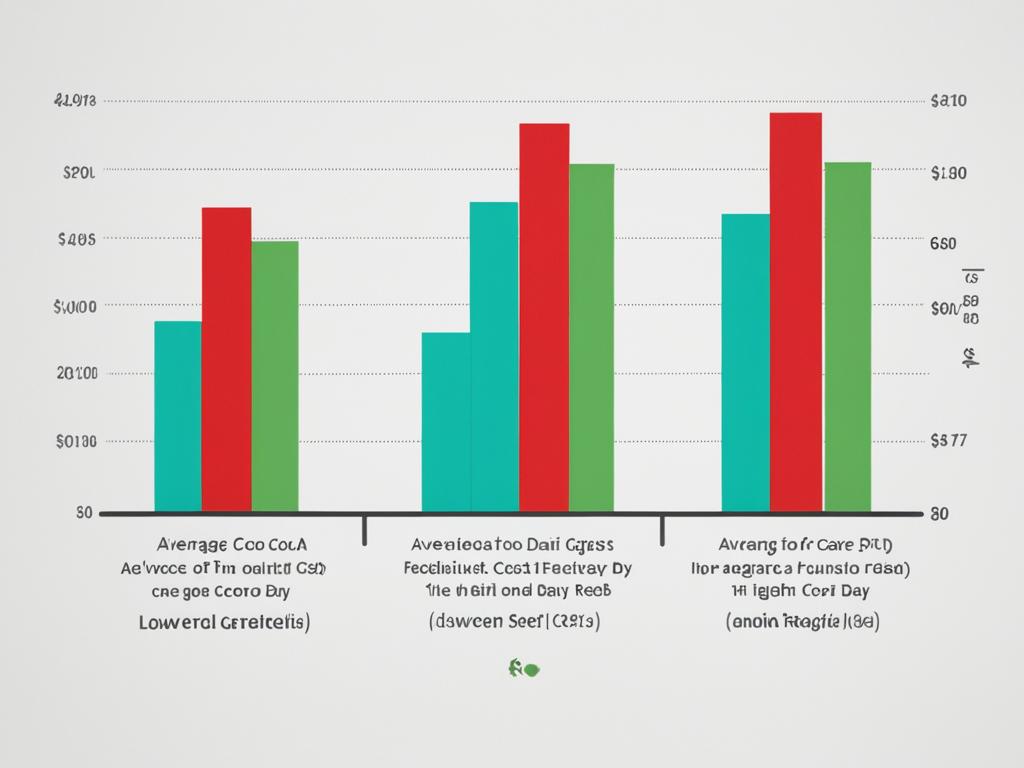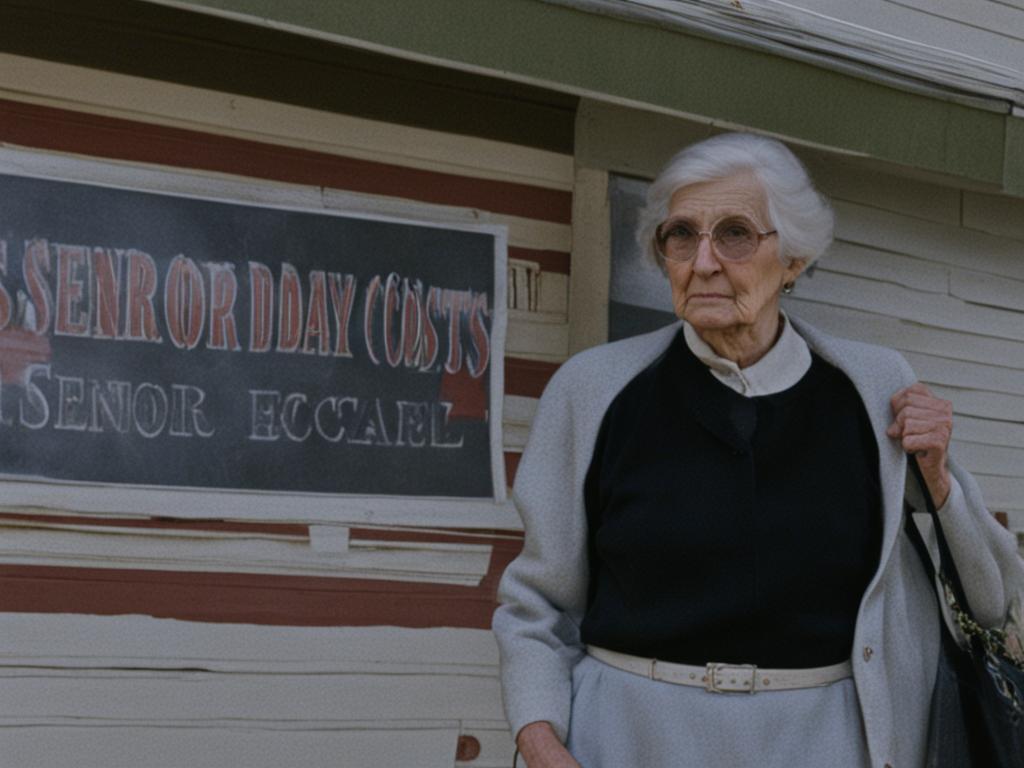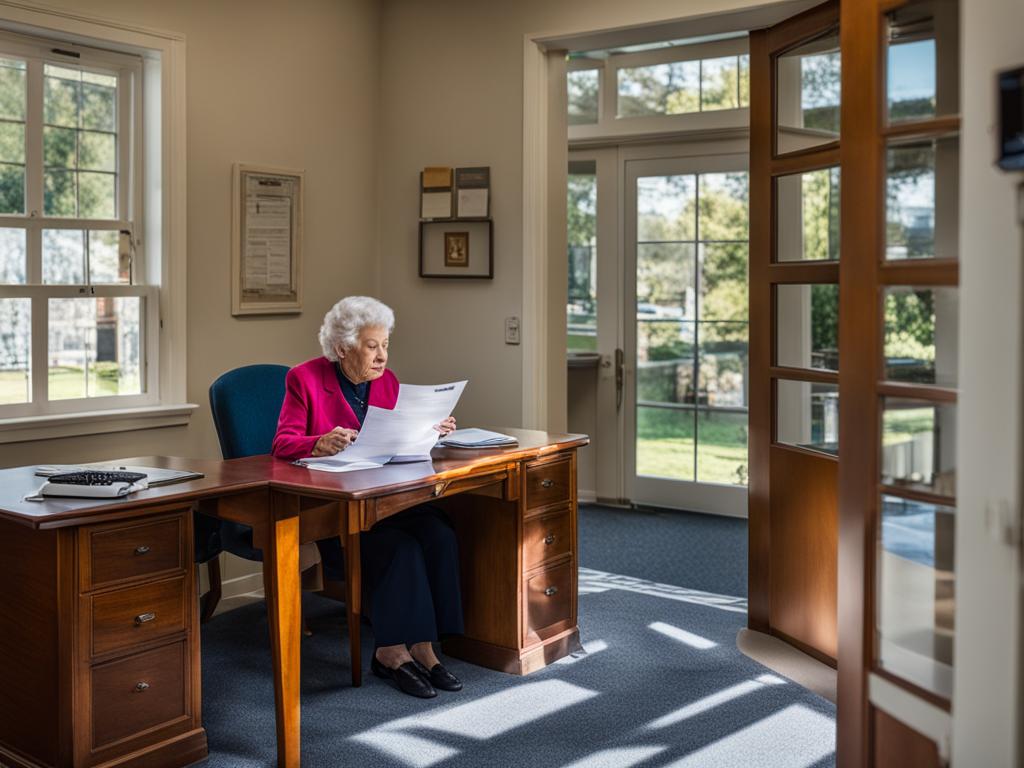Elderly Day Care Cost: Affordable Options Explored
As our loved ones age, it becomes increasingly important to ensure they receive the care and support they need. Adult day care centers offer a supervised environment where older adults can socialize and engage in various activities during the day. However, one common concern is the cost of adult day care. The average cost can vary depending on location, services offered, and the specific needs of the senior. On average, it ranges from $25 to $100 per day. There are various ways to make adult day care more affordable, such as Medicaid, veterans benefits, long-term care insurance, state and local programs, private payment options, sliding scale fees, and financial assistance.
Key Takeaways:
- Elderly day care can be costly, with average daily rates ranging from $25 to $100.
- Affordable options for elderly day care include Medicaid, veterans benefits, and long-term care insurance.
- State and local programs, private payment options, sliding scale fees, and financial assistance are additional ways to make adult day care more affordable.
- Researching and comparing options in your area can help find the most cost-effective and suitable elderly day care services.
- Planning ahead, exploring funding options, and utilizing available resources can alleviate financial burdens and ensure ongoing care and support.
Understanding the Cost of Adult Day Care
When it comes to adult day care, understanding the cost is crucial. The average cost of adult day care can range from $25 to $100 per day, depending on various factors. These factors include location, services offered, and the specific needs of the senior.
One factor that affects the cost of adult day care is the type of service chosen. Adult day care centers that specialize in providing care for conditions like dementia or Alzheimer’s disease may have a lower staff-to-patient ratio, which can impact the cost.
Another factor that can influence the cost is whether the adult day care center is public or private. Public adult day care centers may receive government funding or subsidies, which can make them more affordable for seniors. On the other hand, private adult day care centers may have higher costs, as they rely on private payments and donations to cover their expenses.
It’s also important to consider the types of services offered by adult day care centers. Some centers may provide additional amenities and activities, such as therapy programs, specialized care, transportation services, or meals. These additional services can contribute to the total cost of adult day care.
Factors Affecting Adult Day Care Costs:
- Location
- Type of adult day care service
- Staff-to-patient ratio
- Public vs. private adult day care centers
- Additional services offered
By understanding the factors affecting adult day care costs, individuals and families can make informed decisions that align with their budget and the specific needs of their loved ones.
Ways to Afford Adult Day Care
Adult day care services offer valuable support and care to older adults, but the cost can be a concern for many families. Fortunately, there are various options available to make adult day care more affordable. Understanding these options can help alleviate financial stress and ensure access to quality care for your loved ones.
Medicaid
One of the primary ways to cover the cost of adult day care is through Medicaid. This joint federal and state program provides financial assistance to individuals and families with low income and limited assets. Eligibility for Medicaid coverage varies by state, but it often includes provisions for adult day care services. By meeting income and asset limits, individuals can receive financial support for adult day care costs.
Veterans Benefits
Veterans and their spouses may be eligible for benefits through the Department of Veterans Affairs (VA) that can help cover the cost of adult day care. These benefits are designed to provide support and care for veterans and their families. The VA offers various programs that may include coverage for adult day care services, depending on the veteran’s eligibility and specific needs.
Long-Term Care Insurance
Long-term care insurance policies can also help cover the cost of adult day care services. These insurance policies are specifically designed to provide financial support for long-term care needs, including adult day care. The terms of coverage may vary, so it is important to review the policy details and understand what expenses are included.
State and Local Programs
Many state and local programs offer financial assistance for adult day care based on income and need. These programs aim to support individuals and families who may not qualify for Medicaid but still require financial assistance. Research and reach out to state and local government agencies to explore the programs available in your area.
Private Payment Options
If you have private payment options available, such as retirement funds or the option to cash out a life insurance policy, these can be utilized to afford adult day care services. Private payment allows for flexibility and may be a viable solution for those who do not qualify for government assistance programs.
Sliding Scale Fees
Some adult day care centers offer sliding scale fees based on income. This means that the cost of care is adjusted according to an individual’s financial situation. Sliding scale fees can help make adult day care services more affordable and accessible to a wider range of families. Contact adult day care centers in your area to inquire about sliding scale fee options.
Financial Assistance and Non-Profit Organizations
There are also various non-profit organizations that provide financial assistance for adult day care services. These organizations often have specific eligibility criteria and application processes. Research local non-profit organizations that focus on senior care and inquire about any financial assistance programs they offer.
It’s important to explore all available options to find the best solution for affording adult day care. Each option has its own eligibility requirements and benefits, so it’s crucial to thoroughly research and understand the specific details of each program or avenue of financial assistance. By taking the time to explore these options, you can ensure that your loved ones receive the care they need without experiencing excessive financial strain.

By utilizing Medicaid, veterans benefits, long-term care insurance, state and local programs, private payment options, sliding scale fees, and financial assistance from non-profit organizations, families can find ways to make adult day care more affordable. It’s crucial to assess your specific situation and explore the options available in your area. Affordable adult day care is possible, and these options can help ensure that your loved ones receive the care they deserve.
Planning Ahead for Adult Day Care Costs
When it comes to adult day care, planning ahead and budgeting for the costs is crucial. By being well-prepared, you can ensure that your senior loved one receives the care they need without breaking the bank. Here are some essential steps to take:
- Research and compare adult day care centers: Take the time to explore different adult day care centers in your area. Look into the services they offer, the qualifications of their staff, and their reputation within the community. This research will help you get a sense of the average costs and amenities provided by different centers.
- Assess your senior loved one’s needs: Consider the specific needs and preferences of your senior loved one. Do they require specialized care for conditions such as Alzheimer’s or dementia? Are there any specific medical needs that need to be addressed? Understanding their unique requirements will help you choose an adult day care center that can meet their needs effectively.
- Compare the costs: Once you have a list of potential adult day care centers, compare the costs of their services. This will help you determine which centers are within your budget and offer the services your loved one needs. Take note of any additional fees or expenses that may be involved, such as transportation or additional activities.
- Explore funding options: Adult day care costs can be offset by exploring different funding options. Consider options such as Medicaid, veterans benefits, long-term care insurance, and financial resources available in your area. These funding sources can help make adult day care more affordable and accessible for your senior loved one.
By planning ahead and taking these steps, you can ensure that you find the right adult day care center for your senior loved one’s needs while staying within your budget. Remember, adult day care provides a valuable service that promotes socialization, engagement, and overall well-being for seniors. It’s worth investing the time and effort to find the right option.
Types of Senior Day Care
When it comes to senior day care, there are different options to consider based on the needs and preferences of your loved one. Here are three common types of senior day care:
1. Adult Day Care Centers
Adult day care centers provide a structured environment where older adults can spend their days. These centers offer a range of activities and services tailored to meet the physical, social, and emotional needs of seniors. From recreational activities and exercise programs to socialization opportunities and nutritious meals, adult day care centers aim to enhance the overall well-being of their participants. They often operate during standard business hours and may have both full-day and half-day options available.
2. In-Home Care
In-home care allows seniors to receive support and assistance in the comfort of their own homes. This type of care involves hiring a caregiver who can provide personalized services, such as help with daily activities, medication reminders, companionship, and light housekeeping. In-home care offers flexibility and individualized attention, allowing seniors to maintain their independence while receiving the assistance they need.
3. Respite Care
Respite care provides temporary relief for family caregivers who may need a break from their caregiving responsibilities. It involves arranging for short-term care for the senior, either in a specialized facility or within the home. Respite care offers a safe and supportive environment for the senior while their caregiver attends to other obligations or takes some time for self-care. This type of care can range from a few hours to several days, depending on the needs of the caregiver and the senior.
Each type of senior day care has its own unique benefits and considerations. It’s essential to assess the needs of your loved one and explore the available options to find the most suitable senior day care solution.

Advantages of Senior Day Care
Senior day care offers several advantages for both seniors and family caregivers. It provides respite for family caregivers, allowing them to rest and recharge. Seniors benefit from socialization, a safe and stimulating environment, and access to daily activities that promote physical and mental well-being. It is also a cost-effective alternative to hiring a full-time caregiver or placing the senior in a long-term care facility.
“Senior day care provides a supportive environment where both seniors and their families can experience numerous benefits. It is a respite for family caregivers, giving them the much-needed time to take care of their own needs. By having their loved ones attend senior day care, caregivers can rest, run errands, or attend appointments without worrying about their loved ones’ safety and well-being. This short break from caregiving responsibilities allows caregivers to recharge and prevent burnout.”
For seniors, day care centers offer a safe and stimulating environment where they can interact with peers, make new friends, and engage in a variety of activities. Socialization is essential for seniors’ mental and emotional health, as it helps combat loneliness and depression. Day care centers provide a platform for seniors to engage in conversations, share experiences, and participate in group activities that enhance their overall well-being.
The structured daily activities provided by senior day care centers are designed to promote physical, cognitive, and emotional wellness. From exercise classes to arts and crafts, seniors can enjoy a range of activities tailored to their interests and abilities. These activities help maintain mobility, improve cognitive function, and provide opportunities for personal growth and self-expression. Additionally, the trained staff members at day care centers ensure the safety and well-being of the seniors, providing peace of mind for both the seniors and their families.
Furthermore, senior day care is a cost-effective alternative to full-time care options such as hiring a professional caregiver or moving the senior to a long-term care facility. The cost of full-time care can be prohibitively expensive, making day care centers a more affordable option. This allows families to allocate their resources efficiently while ensuring their loved ones receive the care and support they need.
Socialization and Emotional Well-being
One of the primary advantages of senior day care is the opportunity for socialization and emotional well-being. Many seniors may experience isolation and loneliness due to various factors, including the loss of spouses, friends, or mobility limitations. However, day care centers provide a social community for seniors to interact with others, form new friendships, and combat feelings of loneliness and depression. Socialization not only improves mental well-being but also helps seniors maintain cognitive abilities and overall happiness.
Safe and Stimulating Environment
Senior day care centers create a safe and stimulating environment for their attendees. These centers are equipped with trained staff members who ensure the safety and well-being of the seniors. Additionally, day care centers offer a variety of activities designed to engage seniors physically, mentally, and emotionally. These activities range from exercise classes and games to arts and crafts, promoting overall wellness and preventing cognitive decline.
Respite for Family Caregivers
Senior day care provides much-needed respite for family caregivers who are responsible for the daily care of their loved ones. Caregiving can be physically and emotionally demanding, leading to caregiver burnout. By enrolling their loved ones in day care centers, family caregivers can take a break, attend to their own needs, and recharge. This respite allows them to provide better care to their loved ones in the long run.
| Advantages of Senior Day Care |
|---|
| Respite for family caregivers |
| Socialization and emotional well-being for seniors |
| Safe and stimulating environment |
| Access to daily activities promoting physical and mental well-being |
| Cost-effective alternative to full-time care |
Average Costs of Senior Day Care
When considering senior day care options, it’s essential to understand the average costs associated with the different types of care. The cost of adult day care centers, in-home care, and respite care can vary based on various factors such as location, services provided, and staff qualifications.
Cost of Adult Day Care Centers
Adult day care centers provide a structured and socially engaging environment for older adults during the day. The average cost of adult day care centers ranges from $25 to $150 per day. This cost typically includes meals, activities, and access to healthcare professionals. However, the specific pricing may vary depending on the location and the services offered by the center.
Cost of In-Home Care
In-home care involves hiring a caregiver to provide assistance and support to the senior in their own home. The average cost of in-home care ranges from $15 to $40 per hour. The exact price depends on factors such as the level of care required, the number of hours needed, and the qualifications of the caregiver.
Cost of Respite Care
Respite care offers temporary relief for family caregivers by providing short-term care for the senior in a specialized facility or home setting. The average cost of respite care ranges from $80 to $200 per day. The cost varies based on the location, duration of care, and any additional services included.
It’s important to note that these cost ranges are approximate and can vary significantly depending on individual circumstances and geographic location. To get accurate cost estimates, it’s best to contact local senior day care providers and inquire about their pricing structures.
“The cost of senior day care varies based on factors such as location, services provided, and staff qualifications.”
Understanding the average costs of senior day care can help families plan and budget for the care of their loved ones. By considering the different options and their associated costs, individuals can make informed decisions that align with their budget and the specific needs of the senior.

| Type of Senior Day Care | Average Cost Range |
|---|---|
| Adult Day Care Centers | $25 – $150 per day |
| In-Home Care | $15 – $40 per hour |
| Respite Care | $80 – $200 per day |
Factors Affecting Senior Day Care Costs
Senior day care costs are influenced by various factors that can impact the overall pricing. Understanding these factors can help families make informed decisions about the type of care suitable for their loved ones.
Type of Care
The type of care chosen, whether it’s adult day care centers, in-home care, or respite care, can greatly affect the cost. Each type offers different levels of service and attention, resulting in varying price points.
Location
The location of the senior day care facility plays a role in determining the cost. Urban areas tend to have higher prices compared to rural or suburban locations. It’s important to consider the cost of living and local market rates when budgeting for senior day care.
Services Provided
The range of services offered by a senior day care center can affect the cost. Facilities that provide additional amenities and specialized care may have higher rates compared to those offering basic services. It’s essential to evaluate the specific needs of the senior and determine the level of care required.
Staff Qualifications
The qualifications and experience of the staff members can also impact senior day care costs. Centers with highly trained and experienced staff may charge higher rates due to the expertise and quality of care they provide.
When considering senior day care options, it’s important to assess these factors to ensure that the cost aligns with the level of care needed and the family’s budget. The table below summarizes the key factors affecting senior day care costs:
| Factors Affecting Senior Day Care Costs |
|---|
| Type of Care |
| Location |
| Services Provided |
| Staff Qualifications |

By considering these factors, families can make well-informed decisions when selecting a senior day care facility that provides the necessary care and support within their budget.
How to Pay for Senior Day Care
When it comes to funding senior day care, there are various options available to offset the costs. Whether you choose private pay options, rely on government programs, or explore insurance coverage, there are resources to help make senior day care more affordable. Here are some ways to pay for senior day care:
1. Private Pay Options
Private pay options allow individuals or families to directly pay for senior day care services out of pocket. This can be a viable choice for those who have the financial means to cover the costs without assistance.
2. Medicaid
Medicaid is a federal and state program that provides health coverage to low-income individuals and families. In some cases, Medicaid may cover some or all of the cost of senior day care for eligible seniors. Eligibility for Medicaid is based on income and asset limits, so it’s important to check the requirements in your state.
3. Veterans Benefits
Veterans benefits through the Department of Veterans Affairs (VA) can help cover the cost of senior day care for eligible veterans and their families. These benefits may include financial assistance specifically designated for adult day care services. Veterans should reach out to their local VA office to explore the resources available to them.
4. Long-Term Care Insurance
Long-term care insurance policies may include coverage for senior day care services. It’s important to review your policy to understand the details and limitations of the coverage. If you have a long-term care insurance policy, contact the provider to determine if senior day care is included in your coverage.
5. Area Agency on Aging
Area Agencies on Aging are organizations that provide a range of services and support for older adults and their families. These agencies may offer funding or financial assistance programs for senior day care. Contact your local Area Agency on Aging to inquire about available resources in your area.
6. Program of All-Inclusive Care for the Elderly (PACE)
The Program of All-Inclusive Care for the Elderly (PACE) is a comprehensive healthcare program that offers a range of services, including adult day care, for eligible individuals. PACE programs are available in certain states and provide funding or assistance to offset the costs of senior day care. Check if there is a PACE program in your area and explore its eligibility requirements.
7. Tax Credits
Some states offer tax credits or deductions for senior day care expenses. These tax benefits can help reduce the financial burden of paying for senior day care. Check with your state’s tax department or consult with a tax professional to see if you qualify for any tax credits or deductions.
By exploring these different payment options, you can find a solution that best suits your financial situation and ensures that your loved one receives the necessary care and support in a senior day care setting.

Eligibility Requirements for Senior Day Care Benefits
When it comes to accessing senior day care benefits, different funding options have specific eligibility requirements. Understanding these requirements is crucial for seniors and their families to determine their eligibility and access the necessary financial support. Let’s explore the eligibility criteria for some common sources of senior day care benefits:
Medicaid Eligibility
Medicaid is a government program that provides healthcare coverage for low-income individuals. Eligibility for Medicaid varies by state, but typically, income and asset limits are key factors considered. Seniors who meet the income and asset requirements may be eligible for Medicaid-funded senior day care benefits.
Veterans Benefits Eligibility
Veterans benefits are available through the Department of Veterans Affairs (VA) to eligible veterans and their spouses. To qualify for veterans benefits that cover senior day care, veterans must meet specific criteria related to their service and disability status. These requirements may vary, so it’s essential to consult with the VA to determine eligibility.
Long-Term Care Insurance Coverage
Long-term care insurance is a private insurance policy that covers the costs of long-term care services, including senior day care. The eligibility requirements for long-term care insurance coverage depend on the terms and conditions of the policy. Seniors who have a long-term care insurance policy should review their policy documents or consult with their insurance provider to understand the coverage available for senior day care.
Area Agency on Aging Programs
Area Agencies on Aging (AAA) are local organizations that provide various services and resources for seniors and their families. Some AAAs offer financial assistance programs for senior day care based on specific requirements, such as income and need. Eligibility for AAA programs varies by location, so it’s advisable to contact the local AAA to inquire about the eligibility requirements and benefits available.
It’s important for seniors and their families to explore the eligibility requirements of each funding option to determine which programs they may qualify for. Consulting with the relevant organizations and professionals can provide guidance on eligibility and help navigate the application process effectively.
How to Apply for Senior Day Care Financial Assistance
When seeking financial assistance for senior day care services, there are several government programs and resources available to help alleviate the financial burden. By understanding the application process and gathering the necessary documentation, seniors and their families can access the support they need. Consulting with professionals such as elder law attorneys and financial planners can provide valuable guidance on maximizing available resources and navigating the application process.
Research Government Programs
Start by researching government programs that offer financial assistance for senior day care, including Medicaid, veterans benefits, and state-funded programs. These programs can help cover the cost of care for eligible seniors based on specific criteria. Visit their offices or explore their websites to learn more about eligibility requirements, application processes, and the benefits they provide.
The Application Process
The application process for senior day care financial assistance may vary depending on the program and the type of care needed. It typically involves submitting documentation such as proof of income, assets, and medical needs. Follow the instructions provided by the program and ensure that all required documents are complete and accurate. This will help expedite the application review process.
Consult an Elder Law Attorney or Financial Planner
Seniors and their families may benefit from consulting with an elder law attorney or financial planner. These professionals specialize in senior care and can provide guidance on maximizing available resources, exploring additional funding options, and ensuring compliance with legal requirements. They can also help with the application process, ensuring that all necessary documents are prepared and submitted appropriately.

By applying for senior day care financial assistance, seniors and their families can access the support they need to ensure quality care and support for their loved ones. Researching government programs, understanding the application process, and consulting with professionals can help navigate the complexities of securing financial assistance for senior day care services.
How to Find a Senior Day Care in Your Area
When searching for a senior day care center in your area, there are several resources and methods you can use to find the right facility. Here are some effective strategies:
1. Online Directories
Utilize trusted online directories such as Caring.com, SeniorAdvisor.com, and A Place for Mom. These directories provide comprehensive listings of senior day care facilities, allowing you to search based on location, services offered, and user reviews.
2. Area Agency on Aging
Contact your local Area Agency on Aging for valuable information about senior day care services in your area. These agencies specialize in providing resources and support for older adults and can assist you in locating licensed facilities that meet your loved one’s needs.
3. Local Senior Centers
Reach out to local senior centers in your community, as they often have information about senior day care options available. They may have partnerships or recommendations for trusted facilities that cater to the specific needs of older adults.
4. Referrals from Friends and Family
Ask for recommendations from friends and family members who have experience with senior day care. They can provide valuable insights and personal anecdotes that can help in your decision-making process.
5. Site Visits
Once you have identified potential senior day care facilities, it’s essential to schedule site visits. This will allow you to see the facility in person, observe the environment, and interact with the staff. During the visit, ask questions about the services provided, staff qualifications, safety measures, and daily activities. This firsthand experience will give you a better sense of whether the facility aligns with your loved one’s needs and preferences.
By utilizing online directories, contacting the Area Agency on Aging, seeking recommendations, and conducting site visits, you can gather the necessary information to make an informed decision and find a senior day care center that provides high-quality care and support for your loved one.
Financially Planning for Senior Day Care as a Family Caregiver
As a family caregiver, it is crucial to financially plan for senior day care costs. By understanding your available resources and exploring creative options, you can alleviate financial strain and ensure your loved one receives the care they need. Here are some key steps to help you create a budget and explore alternative funding sources:
Determine Your Available Resources:
Start by assessing your finances and identifying your available resources. This includes considering your income, savings, and any insurance policies that may cover senior day care expenses. Understanding your financial situation will provide a clear picture of what you can afford.
Create a Budget:
Once you have determined your available resources, it is essential to create a budget. Research the average costs of senior day care in your area and compare them to your financial capabilities. This will help you establish a realistic budget that allows for quality care within your means.
Explore Alternative Funding Sources:
If your budget falls short of covering the full cost of senior day care, there are alternative funding sources to consider:
- Crowdfunding: Crowdfunding platforms provide an opportunity to raise funds from friends, family, and even strangers who support your cause. Setting up a campaign and sharing it with your network can help generate financial support for senior day care costs.
- Home Sharing: Home sharing programs connect caregivers with seniors who need assistance and are willing to share their home in exchange. This arrangement can provide housing for the caregiver and reduce overall expenses.
- Non-Profit Organizations: There are non-profit organizations that offer financial assistance, grants, or scholarships specifically for senior day care. Research and reach out to these organizations to explore potential funding opportunities.
- Bartering: Consider bartering services with others who may be in a similar caregiving situation. For example, you could exchange caregiving services for home repairs or other essential tasks that you may need assistance with.
By exploring these alternative funding sources, you may find additional resources to help offset the cost of senior day care and lighten the financial burden.
Having a financial plan in place as a family caregiver is essential for ensuring the well-being of your loved one while managing your own financial stability. By assessing your available resources, creating a budget, and exploring alternative funding sources, you can confidently navigate the financial aspects of senior day care and provide the care your loved one deserves.

Conclusion
In conclusion, adult day care provides a valuable solution for older adults who require supervision and support during the day. The cost of adult day care can be managed by exploring various funding sources such as Medicaid, veterans benefits, long-term care insurance, and state and local programs. By planning ahead and considering different options, families can find affordable alternatives for elderly day care costs while ensuring their loved ones receive the care and support they need.
It is important to research and compare adult day care centers in your area to determine average costs and services offered. Additionally, understanding the eligibility requirements and application processes for financial assistance programs like Medicaid and veterans benefits is crucial. With the right information and careful financial planning, families can navigate the expenses of adult day care and make it a sustainable option for ongoing care and support.
By finding the right adult day care solution, both seniors and their caregivers can benefit from the peace of mind that comes with accessing quality care. Adult day care centers provide a safe and stimulating environment for socialization and engagement, contributing to the overall well-being of seniors. With affordable options available, families can ensure that their elderly loved ones receive the necessary support while maintaining their own financial stability.
FAQ
What is the average cost of adult day care?
The average cost of adult day care ranges from $25 to $100 per day.
What factors can affect the cost of adult day care?
The cost of adult day care can be influenced by factors such as location, services offered, and the specific needs of the senior.
How can I make adult day care more affordable?
There are various ways to make adult day care more affordable, including Medicaid, veterans benefits, long-term care insurance, state and local programs, private payment options, sliding scale fees, and financial assistance.
How should I plan ahead for adult day care costs?
Research and compare adult day care centers in your area, consider the specific needs of your loved one, and explore funding options such as Medicaid, veterans benefits, insurance policies, and financial resources.
What are the different types of senior day care?
The different types of senior day care include adult day care centers, in-home care, and respite care.
What are the advantages of senior day care?
Senior day care provides respite for family caregivers, socialization for seniors, a safe and stimulating environment, access to daily activities, and a cost-effective alternative to full-time care.
How much does senior day care typically cost?
The average cost of senior day care can vary depending on the type of care. Adult day care centers can cost between $25 to $150 per day, while in-home care costs $15 to $40 per hour, and respite care can cost between $80 to $200 per day.
What factors can affect senior day care costs?
Senior day care costs can be influenced by factors such as the type of care, location, services provided, and staff qualifications.
How can I pay for senior day care?
Senior day care can be paid for through private pay options, Medicaid, veterans benefits, long-term care insurance, area agency on aging programs, or tax credits.
What are the eligibility requirements for senior day care benefits?
Eligibility requirements for senior day care benefits can vary depending on the program. Medicaid eligibility is based on income and asset limits, veterans benefits have specific criteria for service and disability, and long-term care insurance policies may include coverage for senior day care based on the terms.
How do I apply for senior day care financial assistance?
To apply for senior day care financial assistance, you will need to follow the application process of the specific program. This may involve providing documentation of income, assets, and medical needs. Consulting with an elder law attorney or financial planner can provide guidance on maximizing available resources.
How can I find a senior day care center in my area?
You can find a senior day care center in your area by using online directories like Caring.com, SeniorAdvisor.com, and A Place for Mom. Contacting the local Area Agency on Aging, senior centers, and asking for recommendations from friends and family can also be helpful. Conducting site visits will give you a better sense of the facility, services, and staff.
How can I financially plan for senior day care as a family caregiver?
Family caregivers can financially plan for senior day care by determining their available resources, creating a budget based on research and available resources, and considering creative options such as crowdfunding, home sharing, non-profit organizations, and bartering.




